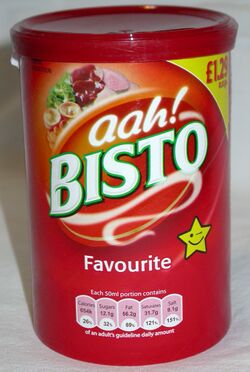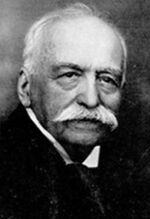Bisto
“Bisto is the single greatest culinary contribution England has ever made to us. I drink a glass every morning with my pickled egg.”
Bisto is a popular meat-related drink and/or food stuff brewed and consumed primarily in the United Kingdom. Bisto was invented by mathematician and engineer Frank Bisto in 1826 as a bubble-bath moisturiser for his elderly mother Edith Bisto. Now replaced with products such as Matey, half a pint of Bisto (then called Bisto’s Edible Bath-Time Ointment) was diluted into a bathtub of hot water creating a thick, brown, nourishing gloop in which his mother would sit and be recharged.
Heritage
The Bisto family are famous for many achievements. Below are some notable members of their empire:
- Sir. William Bisto
- Billy Bisto is the current CEO of Bisto Inc. He has successfully turned the company’s fortunes around since the great economic crash of 1978 (in which Bisto’s share value dropped significantly) and the company now operates on a profit of over 1.2 billion GBP per annum.
- Frank Bisto
- Frank Bisto is attributed with the invention of the original bath time ointment and subsequent meat-related drink we all know and cherish.
- Robert Bisto
- Little is known about Bob Bisto, or ‘The Great Bob Bisto’, in only that he was a ringmaster and a notorious slaver who ran his famous travelling circus: ‘The Great Bisto’s Wonderful Circus’ during Victorian times. His gravestone was recently excavated after being discovered next to Westminster Abbey.
- Catherine Bisto-Matthews
- Catherine Bisto married into the Matthews family in the 1980s and became a leading spokeswoman for the welfare of Turkey (animal)turkeys. She also formed and ran the ‘Respect The Turkey Day’ campaign in the 1990s. It was poorly received.
- Edith Mary Petunia Bisto
- Cyber-organic half-mother of the late great Frank Bisto whose ailments and issues with charging up her battery packs inspired the young Frank to invent Bisto.
Description
Bisto, when fully brewed and filtered, is a thick, dark brown substance and features a pungent foam on its surface (colloquially referred to as ‘cow-top’ in northern England). It’s recommended that Bisto is served at room temperature, although many Bisto vendors serve it chilled in a glass or piping hot in egg cups. Traditionally in Scotland a range of deep fried foods such as chicken dippers, scotch eggs and pizza are usually served with a piping-hot pint of Bisto.
Varieties
Many varieties of Bisto exist. The most popular is in its drink form which can be found at Bisto vendors throughout the UK. Homebrew users can also acquire Bisto in its unnatural freeze-dried form from various stockists and suppliers online and on the high street. With the introduction of freeze-drying their products, Bisto changed their company's fortunes forever. The revolutionary procedure of preserving and storing Bisto in cardboard tubes for home use, and stay uncontaminated for up to 200 years without bacterial infection, changed Bisto from a weekly treat for all the family into a delicious daily addiction for millions.
As a result of freeze-drying Bisto, the company expanded their empire and introduced more flavours and varieties to increase Bisto's already solid popularity:
B-Blocks
- B-Blocks were introduced in the 1940s to help with the war effort. Small blocks of compressed natural Bisto were coated in animal fat which when dissolved in hot milk provided a human with the full calorific content they need for the day. The flavour and versatility of the BBs was famously championed by Winston Churchill in his famous televised war-time speech We Shall Never Surrender: "We shall defend our island, whatever the cost may be, we shall fight on the beaches, we shall fight on the landing grounds, we shall fight in the fields and in the streets, and with B-Blocks as a delicious natural source of energy, containing all the calories a fighting man or women needs for the day; we shall never surrender."
Goose Bisto
- Goose Bisto was released in December 1976 in an attempt to corner the Christmas Gravy Rush of 1976. Unfortunately, swapping 'beef' flavours for 'goose' flavours backfired after someone noticed that it's saturated fat content had tripled thus making it unsuitable for the elderly; Bisto's core users. The product was discontinued in February 1977.
White Bisto
- After a slump in sales during 1965, Bisto decided to market ‘White Bisto’ as an alternative milder beverage to encourage woman and children to drink more of it. Unfortunately, Bisto’s marketing campaign was poorly received and after failing to convince the public of the health benefits of feeding your baby White Bisto, the sub brand was quickly removed from sale. Due to is scarcity, White Bisto is now sought after by collectors world-wide.
Bisto Gas
- Tried and tested in the 1960s, Bisto Gas was deemed to be inedible by the British Foods Standards Agency (FSA) and was banned before Bisto had officially deployed it onto the high streets.
Brewing
In the initial stages of brewing, Bisto is supremely white due to its high fat content. White Bisto (sometimes 'First Bisto') is then rendered down using witchcraft and unusual rituals before being filtered with a big metal thing until its colour changes into the familiar natural shit-brown colour. Bisto is then re-filtered and distilled several times over to remove any lingering shrapnel or body parts creating a smoother more luxurious product. The recipe and ingredients are a closely guarded secret and have never been disclosed.
Flavour
Bisto's flavour is likened to a rich beef stock or broth, although hints of liquorice, banana and termite can be found in its complex flavour profile. Contrary to popular belief, Bisto’s ingredients have never been disclosed and as a result food writers and chefs from around the world have argued it’s contents for decades. World-famous Frenchman and inventor of food Auguste Escoffier once quipped to the British press: "Bosto? I fucking love the stuff. It’s silky, meaty, undulating wave forms are a chef’s wet dream."
Advertising
Bisto has a long history of advertising on radio, in print and television. Originally relying on it's word-of-mouth appeal, Bisto's first advert was a radio campaign encouraging children to drink more of it. It's now famous tagline "Ah, Bisto." was derived from the original radio spot in which a young boy from Yorkshire describes how he travels to and from school during winter time and drops by an old ladies house on his journey. Here is an except from the transcript to the original radio spot: "Sorry to wake thee luv, but ast thee any Bistor? As reet thursty wit all't walkin' int t'hills... reet cold this tar'met year... Cud doo wit warmerer, ast thee any?"
Some years later, when the people of the UK realised that all people from Yorkshire are long-chinned buffoons who struggle with the English language, they changed tact and decide to target 'mothers and babies' in an effort to expand their user base. Another successful radio campaign entitled 'The Bisto Baby' (with accompanying printed adverts) was launched doubling Bisto's revenue over a period of just six months (then making them the 7th largest private company in the UK).
In the 1940s, and with the full support of Winston Churchill, Bisto and the UK government joined forces to create and advertise Bisto's 'B-Blocks' in an attempt to help the war effort. Various radio spots and television adverts were created featuring various celebrities from the UK and the USA (most famously Frank Sinatra) who were seen to be gleefully quaffing B-Block Bisto before quipping the tagline: "I B-Block for freedom, do you?". Some say that Bisto's perfectly timed introduction of B-Blocks to the allied countries severly damaged the Nazi's morale, causing mass suicide in various German population centres including the notoriously liberal village of Dresden, which was later covered up by an extensive propaganda campaign by the fascist German government.
| Featured version: 10 March 2014 | |
| This article has been featured on the main page. — You can vote for or nominate your favourite articles at Uncyclopedia:VFH. | |





